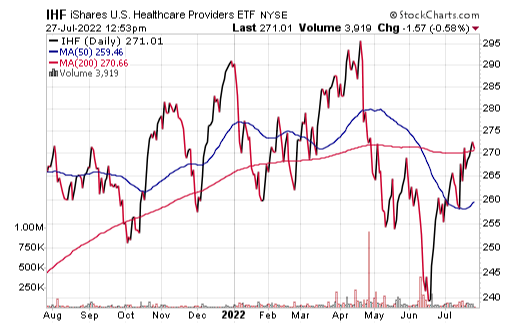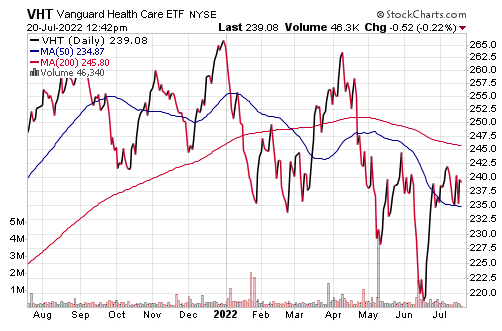Health care is a sector that seems poised to benefit from an array of long-term trends, suggests Jim Woods, editor of The Deep Woods; here, the exchange-traded fund expert reviews two ETFs focused on the health sector.
It is a well-known fact that the average age of Americans is increasing due to generational trends and improved health care. As advances in health care make longer lives possible, that trend may very well continue.
There are many ways to benefit from increases in health care stock prices, but one path for investors who may not be interested in the risk associated with individual stocks is exchange-traded funds (ETFs). One prime example is iShares Healthcare Providers ETF (IHF).
IHF provides broad exposure to U.S. companies on a cap-weighted basis that are engaged in managed health care and insurance, excluding frequently higher-risk pharmaceutical companies.
Over the last year, this fund has beaten the S&P 500 handily. It has also performed well in the last month, which may make it appealing as a momentum strategy.
Top holdings for this fund include UnitedHealth Group (UNH), 23.19%; CVS Health Corp. (CVS), 13.97%; Elevance Health (ELV), 7.92%; Humana (HUM), 4.74%; and Cigna Corp. (CI), 4.73%.
Notably, industry giant UnitedHealth Group takes up a sizable chunk of IHF’s holdings due to the fund’s cap-weighting strategy. The company is a solid and stalwart holding that has offered impressive returns over the long haul.
After all, companies do not reach $500 billion in market cap without doing a few things right. The solid and steady backbone provided by UNH and CVS Health Corp. may decrease the volatility level of the fund.
Health care is here to stay and likely to continue to advance technologically in the future. We may not know exactly what that will look like, but we can guess that many of the companies represented in iShares Healthcare Providers ETF will be involved in that future.

Vanguard Health Care Index Fund (VHT) tracks an index of health care companies in the United States. The fund’s managers define “health care” rather broadly, ensuring a healthy mix of sectors in the portfolio.
In addition, a policy that no group entity exceeds 25% of the weight of the index, as well as a rule that the aggregate weight of issuers with over 5% weight is capped at 50% of the portfolio, ensures a degree of diversification.
The top holdings in the portfolio are Johnson & Johnson (JNJ), UnitedHealth Group (UNH), Pfizer Inc. (PFE), AbbVie, Inc. (ABBV), Eli Lilly and Company (LLY), Merck & Co., Inc. (MRK), Thermo Fisher Scientific (TMO) and Abbott Laboratories (ABT). The fund has amassed $16.07 billion in assets under management and has an expense ratio of 0.10%.

In short, while VHT does provide investors with access to health care stocks, this kind of ETF may not be appropriate for all portfolios. Thus, interested investors always should conduct their due diligence and decide whether the fund is suitable for their investing goals.










